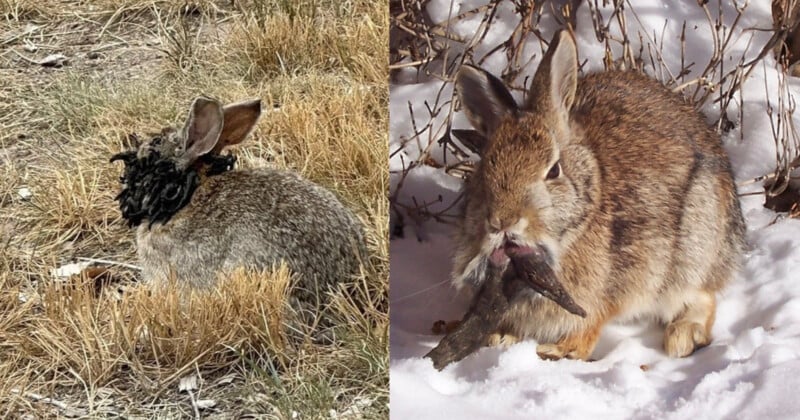Eerie Photos Show Colorado Rabbits with Tentacles Growing Out Their Faces

Haunting photos show a rare virus transforming ordinary rabbits into animals with horn-like and tentacle-shaped black growths on their faces.
People in Fort Collins, Colorado, have reported seeing cottontail rabbits with these unusual growths, drawing comparisons to the zombie-like creatures in the TV show The Last of Us. The grotesque images of the bunnies have sparked concern for the animals’ health and whether the condition poses any risk to humans.
In Fort Collins, Colorado, rabbits with horn-like growths are affected by the Shope papilloma virus, causing benign tumors. These aren't tentacles, and reports are exaggerated. The virus spreads via insects and is harmless to humans. pic.twitter.com/a67IZtHDB0
— PeacefulCanvas (@PeacefulxCanvas) August 12, 2025
The earliest known reports seem to date back to 2024, when a local resident shared a photo online of a rabbit with its head covered in black, spike-like protrusions, but sightings have been increasing. More recent photos show what appear to be toothpick-like or quill-shaped growths jutting from the animals’ mouths and faces.
Resident Susan Mansfield tells 9News Northern Colorado that she has been seeing the same rabbit with black spines or “quills” around its mouth for more than a year.
Some Colorado rabbits are showing strange wart-like growths from a virus spread by insect bites — CPW says it’s harmless to most pets, but keep domestic rabbits safe indoors.
What do you think about these furry horned varmints? #colorado #trending #soco #discover #news pic.twitter.com/wHwPCZn5zJ
— FOX21 News (@FOX21News) August 13, 2025
“It looks like it was black quills or black toothpicks sticking out all around his or her mouth,” Mansfield says “I thought he would die off during the winter, but he didn’t. He came back a second year, and it grew.”
Colorado Parks and Wildlife (CPW) confirms the growths are not harmful to humans or pets, but advises people not to approach or touch the animals.
Officials say the growths are caused by the rare Shope papilloma virus that leads to wart-like skin protrusions, sometimes described as horn-like, on the rabbit’s head and face. The condition is similar to benign cancerous growths and has no known cure.
The virus can spread between rabbits but is not believed to be contagious to humans, dogs, or other wildlife. It usually does not harm the animal unless the growths interfere with the eyes or mouth.
Although there is no public health risk, CPW recommends keeping a distance from infected rabbits and avoiding any attempts to treat or handle them.
“Rabbit papillomas are growths on the skin caused by the cottontail rabbit papillomavirus,” CPW states on its website. “Most infected cottontails can survive the viral infection, after which the growths will go away. For this reason, CPW does not recommend euthanizing rabbits with papillomas unless they are interfering with the rabbit’s ability to eat and drink.”
Image credits: Header photo via Reddit (left) and Clinton Forry via Flickr, CC-by-2.0. (right)